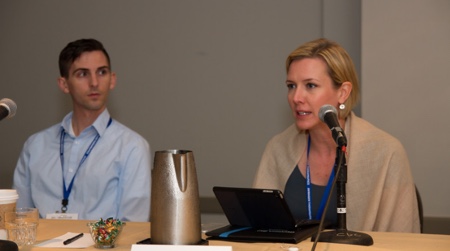Every year, biotech industry leaders throughout the southeastern United States convene at Georgia Bio’s flagship conference. Georgia Bio 2016 was no different as hundreds of professionals representing pharmaceutical manufacturers, patient advocacy groups, innovative growth stage companies, service providers and academic institutions met at the Cobb Galleria Centre on September 28th.
In case you missed it, here were a few of our top takeaways from #GaBioSummit
- It’s going to take a very large village, not reassignment of blame
As the pharmaceutical industry licks its pricing-related wounds, Jim Greenwood, President & CEO of the Bio Industry Organization delivered a breakfast keynote attempting to demonstrate the industry’s ability to deliver value including areas of healthcare spending increasing faster compared to pharma. He highlighted a new advertising campaign and web property dubbed “Innovation Saves” intended to change the public’s perception of the pharmaceutical industry.
We found it a bit surprising that Mr. Greenwood attempted to overtly shift the blame for rapidly increasing drug prices to insurers. In his own words, essentially similar to those he delivered to Forbes last month,
“What patients notice is what comes out of their pockets, [Greenwood said.] “That’s not up to us—it’s up to the insurance companies. If a cancer drug costs $100,000 and an insurer imposes a 30% co-insurance, the patient has to find $30,000. The patient doesn’t have $30,000. Say that price is cut in half. The patient now has to find $15,000. And it might as well be $30,000. People aren’t sitting around with $15,000 in their wallets. We cut our price by two-thirds, and they’re still paying $10,000.
“So we can’t unilaterally remove the burden from the patient. Insurance companies can. Regardless of whether we cut our price by 50% or two-thirds, innovation will be over.”
We know that the shift to value-based care will be challenging for every member of the ecosystem, including innovators, patients, payers and manufacturers. Shifting of blame in an effort to change public perception is not going to win the day. Improving stakeholder alignment and multidisciplinary collaboration will. We see the results of successful, value-based medtech collaboration every day with our partner organizations like Georgia Tech, the Coulter Foundation, Emory University and our commercial partners and sponsors.
- At last, breaking down silos between industry and patients
In perhaps the smartest healthcare programming move of the past decade, Georgia Bio President & CEO Russell Allen, VP of Operations Maria Thacker, Conference Chair Patty Fritz and the Georgia Bio 2016 programming committee convened a lunch keynote led by Jesse Milan, Jr., JD, Interim President & CEO, AIDS United.
To a highly attentive audience, Jesse told an impassioned story about how he recently celebrated his 60th birthday. In no small part due to the phenomenal advancements in science brought by the pharmaceutical industry, Jesse has been living with HIV for 30 years. Jesse then invited Andy Lipman, author and member of the board of directors of the Cystic Fibrosis Foundation, and Suz Schrandt, JD, director of patient engagement for the Arthritis Foundation to join him.
At the age of 38, Andy passed the current median life expectancy for people with Cystic Fibrosis. Andy is now 42 years old. Suz was diagnosed with rheumatic disease at age 14. Hearing what’s needed from the biotech industry and all of its constituents directly from a patient and patient advocate perspective in a room full of industry professionals was just what the doctor ordered when it comes to driving home the importance of innovation and access to therapies. We hope Georgia Bio will continue to include more patient engagement in its programming.
- Tying economic outcomes to clinical studies will be key to value-based development and commercialization
During the afternoon breakout session focused on value derivation, Jake Caines, director of commercial strategy for Curant Health suggested that economic metrics are a ‘must do’ when it comes to clinical trials and studies. In the ACA era, if a product, service or device is not able to improve both sides of the value equation, outcomes divided by costs, it will be severely handicapped in its commercial success.
We completely agree with this and remain highly vigilant on behalf of our customers and sponsors on the shifting, value-based landscape for commercialization of new medical technologies. FDA approval is no longer enough. Medtech innovations must also clear value-based hurdles (superior outcomes, lower costs and ultimately bodies like hospital value-analysis teams) for successful commercialization. We keep an eye on those metrics, and more, in every step on our partners’ development paths.

Michael Sweet, T3 Labs Sr. Preclinical Testing Program Manager, and Tiffany Wilson, CEO of GCMI and T3 Labs, at Georgia Bio 2016
We would like to thank Georgia Bio for their continued leadership and commitment to the advancement of our regional bioscience and medtech community. The GCMI and T3 Labs team was honored to share insights into what’s needed to successfully bring connected devices to market during our breakout session featuring GCMI CEO Tif Wilson, T3 Labs Sr. Preclinical Testing Program Manager Michael Sweet and NFANT Labs CEO Lou Malice. If you’d like to know more about that session and what’s needed to effectively move a new medical product from a back-of-the-napkin idea or more highly evolved concept to cure to commercialization, contact info@devices.net.
We look forward to Georgia Bio 2017!
